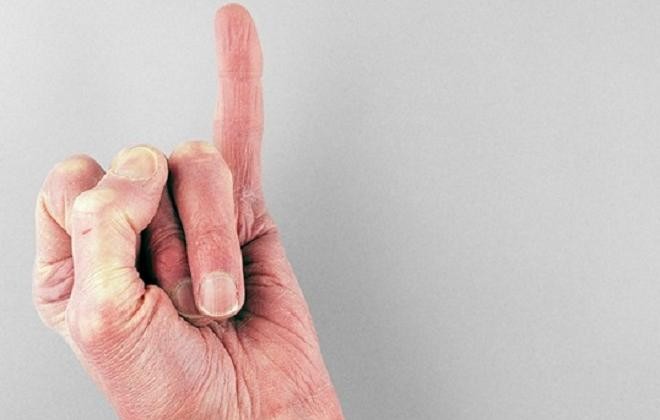Stuart Whipps
10 Apr - 11 May 2014
STUART WHIPPS
10 April - 11 May 2014
Stuart Whipps presents an installation of three new works that bring together disparate strands of his ongoing research into the history of monuments, and the relationship between photographic processes and physical materials. The specific focus here being connections between dead architecture and dead architects.
Research into a 200ft concrete tower in the New Forest built between 1879 and 1885 by spiritualist Andrew Thomas Turton Peterson led Whipps to the figure of Sir Christopher Wren. Peterson claimed Wren had instructed him through a medium on the correct proportions for his ambitious tower, and recorded the dialogue in the spiritualist newspaper ‘The Medium and Daybreak’.
A System For Communicating With The Ghost Of Sir Christopher Wren (2014) resurrects a primitive form of sign language developed by Wren in the 1650s. Using the digits of both hands, individual letters are represented rather than fully formed words, and particular colour coding was devised by Wren as a teaching method. Whipps’ work presents 160 new medium format slides across two slide projectors, one showing a left hand, the other a right. Potential messages generated by the random combination of letters will be recorded throughout the exhibition.
A more tangible ghostly presence in the exhibition is Birmingham Central Library. In 2013 the new Library of Birmingham opened to the public, signalling the final nail in the coffin of its predecessor; which itself only opened in 1974. Despite a recommendation from English Heritage that the building should be granted grade II listed status, it is due to be demolished in 2014/15. Whipps unsuccessfully proposed to the Library authorities that a decorative brick wall from Central Library be relocated within the new library. Despite this rejection he set about removing the bricks, which travel to London to form Birmingham Central Library Wall (2014), and will be reused by Whipps in a number of different contexts in the future.
Stuart Whipps (b.1979) lives and works in Birmingham. His practice explores the relationship between the photographic image and object, between photography and narrative, and the slippery nature of archives. Whipps creates installations and books that tease complex narratives out of historic artefacts and moments. Recent bodies of work have utilised diverse material such as the collected speeches, interviews and statements of Margaret Thatcher, pieces of Scottish shale and found negatives from redundant South African photographic labs. Selected solo exhibitions include: Birth Springs, Death Falls, Flat Time House, London, 2013; Tick, Tack, Tick, Tack, Tick, David Dale Gallery, Glasgow, 2012; Why Contribute to The Spread of Ugliness?, Ikon Gallery, Birmingham, 2011; New Wooabbeleri, Focal Point Gallery, Southend-On-Sea, 2010.
10 April - 11 May 2014
Stuart Whipps presents an installation of three new works that bring together disparate strands of his ongoing research into the history of monuments, and the relationship between photographic processes and physical materials. The specific focus here being connections between dead architecture and dead architects.
Research into a 200ft concrete tower in the New Forest built between 1879 and 1885 by spiritualist Andrew Thomas Turton Peterson led Whipps to the figure of Sir Christopher Wren. Peterson claimed Wren had instructed him through a medium on the correct proportions for his ambitious tower, and recorded the dialogue in the spiritualist newspaper ‘The Medium and Daybreak’.
A System For Communicating With The Ghost Of Sir Christopher Wren (2014) resurrects a primitive form of sign language developed by Wren in the 1650s. Using the digits of both hands, individual letters are represented rather than fully formed words, and particular colour coding was devised by Wren as a teaching method. Whipps’ work presents 160 new medium format slides across two slide projectors, one showing a left hand, the other a right. Potential messages generated by the random combination of letters will be recorded throughout the exhibition.
A more tangible ghostly presence in the exhibition is Birmingham Central Library. In 2013 the new Library of Birmingham opened to the public, signalling the final nail in the coffin of its predecessor; which itself only opened in 1974. Despite a recommendation from English Heritage that the building should be granted grade II listed status, it is due to be demolished in 2014/15. Whipps unsuccessfully proposed to the Library authorities that a decorative brick wall from Central Library be relocated within the new library. Despite this rejection he set about removing the bricks, which travel to London to form Birmingham Central Library Wall (2014), and will be reused by Whipps in a number of different contexts in the future.
Stuart Whipps (b.1979) lives and works in Birmingham. His practice explores the relationship between the photographic image and object, between photography and narrative, and the slippery nature of archives. Whipps creates installations and books that tease complex narratives out of historic artefacts and moments. Recent bodies of work have utilised diverse material such as the collected speeches, interviews and statements of Margaret Thatcher, pieces of Scottish shale and found negatives from redundant South African photographic labs. Selected solo exhibitions include: Birth Springs, Death Falls, Flat Time House, London, 2013; Tick, Tack, Tick, Tack, Tick, David Dale Gallery, Glasgow, 2012; Why Contribute to The Spread of Ugliness?, Ikon Gallery, Birmingham, 2011; New Wooabbeleri, Focal Point Gallery, Southend-On-Sea, 2010.

